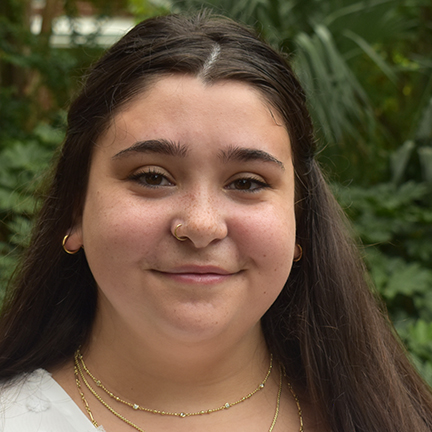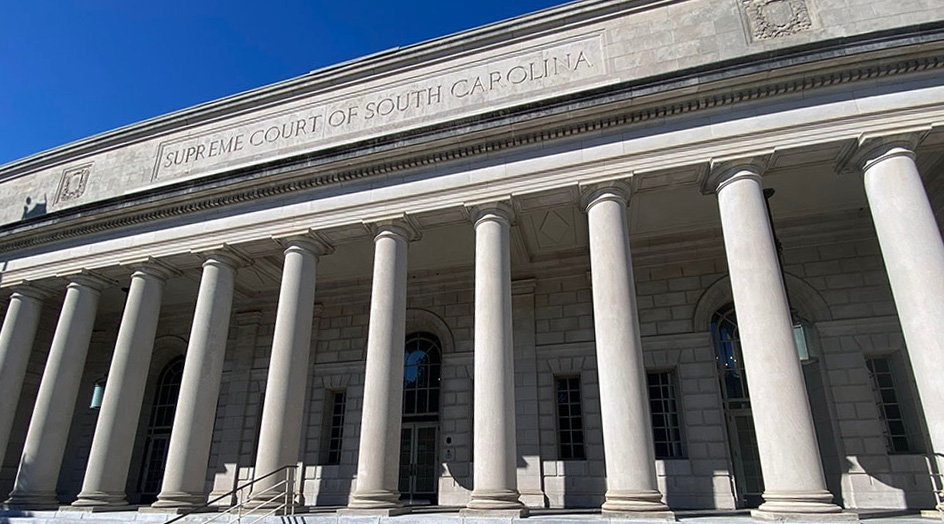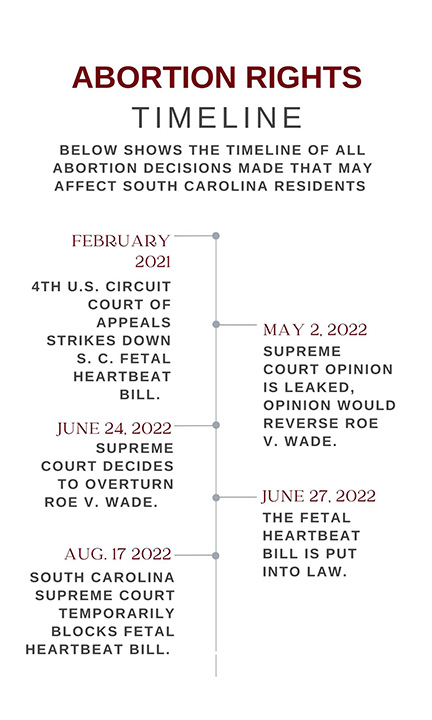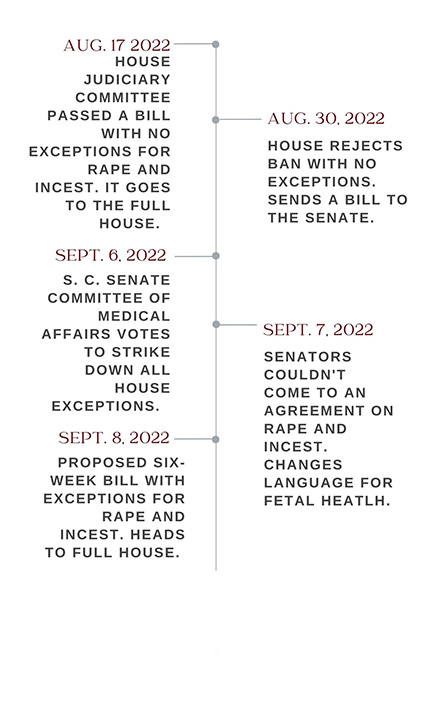The S.C. Supreme Court House in Columbia (Photos and timelines: Julia Goulet)
Privacy is at the crux of the abortion decision being considered by the South Carolina Supreme Court.
The court recently heard arguments regarding the constitutionality of a ban on abortion after six weeks of pregnancy that had been passed by state lawmakers.
Attorneys for Planned Parenthood, activists, leaders from the Statehouse and the governor were each trying to argue whether abortion was allowed by a privacy clause added to the the S.C. constitution in 1971.
The privacy clause, Article 1, Section 10, protects S.C. residents from unauthorized searches and seizures.
The Fourth Amendment of the U.S. Constitution protects people from unwarranted searches and seizures. Tyler Hydrick, an assistant deputy solicitor general, represented Alan Wilson, the state attorney general. Hydrick said past cases described the privacy clause in the S.C. Constitution as the “Fourth Amendment plus,” something that essentially strengthened the amendment rather than broadening it.
Also speaking for the state was Kevin Hall, representing the attorney general and president pro tem of the Senate. He said privacy should be defined according to what was written in the clause, and abortion is not mentioned.
Substantial due process, which was brought up by both sides and the justices as an argument that would protect abortion, allows for courts to protect rights not specifically mentioned in the U.S. Constitution. Abortion is not mentioned in the U.S. Constitution, but has been deemed legal. Hall said abortion isn’t a “deeply rooted” part of S.C. history, and because of this, it could not be protected in South Carolina under the substantial due process argument.
“It has never been a part of the state’s history except in extraordinary circumstances,” Hall said. “This has been true forever.”
Hall’s historical argument was quickly met with questions from the justices, who brought up the 1883 Act of Quickening. That act allows a woman to get an abortion before she feels the fetus kick, which is usually between 14 and 26 weeks.
A lower judge barred the Legislature’s six-week ban, also called the “fetal heartbeat” bill, several weeks after it took effect until the Supreme Court could consider the plaintiffs’ challenge to it. That left in place the state’s previous ban on abortions after 21 weeks and six days.
Julia Murray, who represented Planned Parenthood and other medical professionals arguing against the six-week ban, said the privacy clause protects abortion as a medical procedure due to the ruling of a 1993 case, Singleton v. the State.
In that case, Death Row inmate Fred Singleton sued the state after officers tried to forcibly give him medication before an execution. Singleton sued on the grounds of medical privacy, saying that he couldn’t be forcibly medicated.
He won the case, setting the precedent that South Carolinians have a right to privacy in regard to medical procedures.
That argument was met with lots of questions from the justices as to what is an unreasonable invasion of privacy.
“I just wonder, if we stretch this concept of privacy, where are we on laws that we accept are valid?” Justice John W. Kittredge said. “Prostitution, polygamy, assisted suicide, murder — where do we draw the line?”
It’s unclear when the court will make a decision.
In the meantime, a conference committee made up of six lawmakers, three from the Senate and three from the House of Representatives, is set to meet to resolve the differences between the chambers’ proposals for newer, even more strict bans.
Republicans couldn’t agree on how strict a new law should be, so a bill didn’t pass this spring. Part of the disagreement involved whether to save the life of a fetus when the fetus is endangering the mother’s life. The committee must come to some sort of compromise if it wants a bill before Nov. 13, the date on which the legislature said it would adjourn its extended session.
The key to a compromise is the presence of exceptions in the law, according to Rep. Thomas Pope, R-York.
“You’re holding your spouse by one hand and your child by the other, and they’re both hanging over a cliff,” Pope said. “You can only hang on to one, you know. What do you do? And that’s what these exceptions feel like they’re trying to address, and so I think they’re meaningful.
Sen. Richard Cash, R-Anderson, said he would continue to push an abortion ban next session if the committee is not able to produce a compromise this year.
“Once it’s begun, then we have no other option but to try to come up with a law that will protect human life,” Cash said.
Sen. Margie Bright-Matthews, D-Colleton, said she’d rather see South Carolina codify Roe V. Wade, the 49-year-old law the U.S. Supreme Court overturned this spring. However, she said she’s worried that if no compromise is reached this year, the issue of abortion will take up lots of time in next year’s calendar and draw attention away from other issues.
A timeline of the six-week abortion ban currently being reviewed by the S.C. Supreme Court
A timeline of the six-week abortion ban being reviewed by the S.C. Supreme Court
Kevin Hall makes his argument before the Supreme Court justices as to why abortion is not protected under a privacy clause in the S.C. constitution.
Julia Murray makes her argument as to why abortion is protected by a privacy clause in the S.C. constitution.
ABOUT THE JOURNALISTS

Julia Goulet
Goulet is a senior journalism major, minoring in political science, at the University of South Carolina. She is an opinion writer for the student newspaper, The Daily Gamecock. She was promoted to an opinion beat writer covering university politics. As the current opinion editor she covers topics from state elections to abortion rights. Goulet is a self-published author and has read 185 books (and counting) since January 2021.

Tyler Fedor
Fedor is a senior journalism student at the University of South Carolina from Key West, Florida, and misses the island dearly. His work covering the Columbia Mall shooting earlier this year appeared in The New York Times. He is a managing editor of the student-run Daily Gamecock. He also covered the controversial presidency of Bob Caslen at USC. If he’s not in South Carolina, he’s most likely down in the islands, where he freelances for the local paper.






